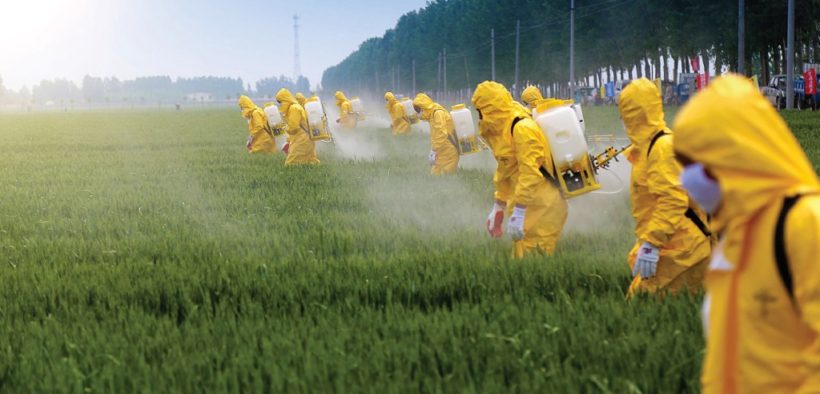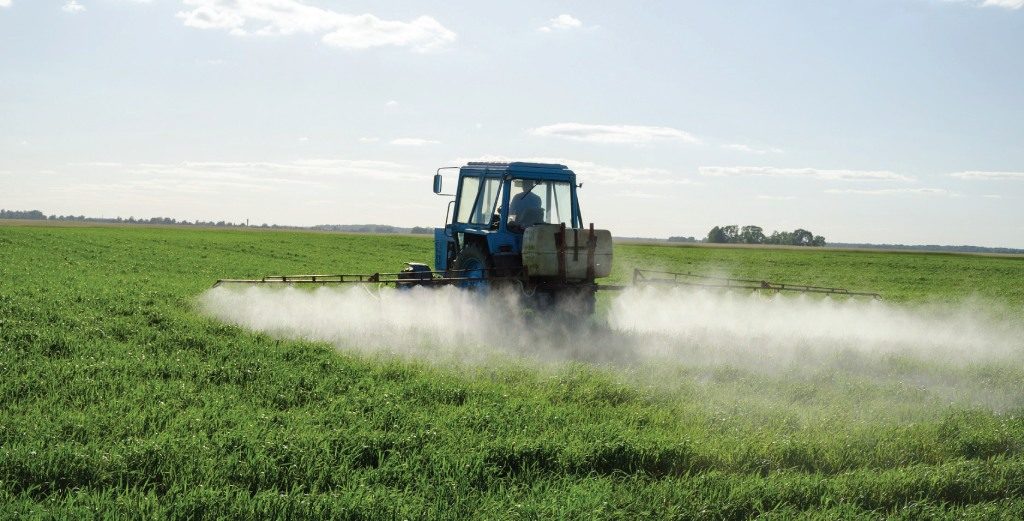It’s A Roundup

One of the world’s leading herbicides is deemed to be carcinogenic, but farmers are still hesitant to give it up
By Anila Mathew Vivek
One of the world’s most commonly used herbicides is in the docks for being carcinogenic. Glyphosate is a broad-spectrum, non-selective systemic herbicide that is used to kill weeds among all annual and perennial plants (like grasses), as well as on a wide variety of crops. It is also sprayed on many bowls of cereal, such as wheat and oats, as a pre-harvest desiccant, to encourage quick and even drying, thus enabling earlier harvesting.
Usually formulated as a grain of isopropylamine salt, it can be described as a phosphanoglycine that does not inhibit cholinesterase activity. Glyphosate-based herbicides are manufactured by many companies across the world and the chemical is easily available in markets. It was first introduced in 1974 by the agrochemical giant Monsanto—acquired by Bayer last year for $63 million—using the trade name, Roundup. Genetically modified seeds are made to be resistant to glyphosate so that it selectively kills only the weeds around the crops. Last August, a California court awarded the terminally-ill former groundskeeper Dewayne Johnson, 46, $289 million as damages to be paid by Monsanto; 4,000 other lawsuits have been filed against Monsanto owing to the toxic product. As of February, 11,200 victims have sued the company.
GENOTOXICITY AND ENDOCRINE DISRUPTION ALSO LEAD TO CHRONIC HEALTH AND DEVELOPMENTAL EFFECTS, CAUSING IMBALANCES IN GUT BACTERIA. GLYPHOSATE HAS BEEN FOUND TO ACCUMULATE IN HUMAN CELLS.
However, Bayer denies the harmful possibilities of its products. It has asked for the jury’s decision to be revoked or a new trial to be conducted. The firm points to evidence by the US Environmental Protection Agency and other foreign regulators that have deemed glyphosate as not likely to be carcinogenic to humans. International Agency for Research on Cancer (IARC), a WHO research wing, termed glyphosate as “probably carcinogenic” in 2015. Other independent scientific studies revealed acute and chronic effects of glyphosate-based herbicides such as interference with various organs and biochemical pathways in mammals. Genotoxicity and endocrine disruption also lead to chronic health and developmental effects, causing imbalances in gut bacteria. Glyphosate has been found to accumulate in human cells.
At low concentrations, it damages the liver, kidney and skin cells and long term effects include cancer, infertility, pregnancy problems, birth defects, and respiratory diseases. Further, the ingredients (adjuvants) added to glyphosate products may be toxic. A new scientific study that looked at the transgenerational effects of Roundup showed evidence of the transfer of carcinogenic after-effects down generations. Increased incidence of prostate, kidney and ovarian diseases, obesity and birth abnormalities were found in the offspring of lab rats exposed to glyphosate. Sri Lanka was the first country to ban glyphosate in 2014 after a study linked it to chronic kidney disease, prevalent in many parts of the country. Researchers discovered that the chemical reacted with cadmium and arsenic in groundwater, making it more toxic. The ban had to be lifted last June, owing to pressure from tea plantation owners, who said they had to face losses because of not using the herbicide.

In Thailand, it is used on plantation crops like oil palm, rubber, and tropical fruits. Farmers and agriculture industry leaders have claimed that the use of glyphosate allowed them to farm without tillage. In a surprise move, Vietnam has also banned the use of the chemical, including imports of grains that are cultivated using the herbicide. European nations like Germany, Belgium, and Netherlands have also banned the use of glyphosate. French President Emmanuel Macron is trying to ban the chemical despite facing stiff resistance from some lawmakers. Meanwhile, the Middle Eastern countries such as UAE, Saudi Arabia, Oman, Kuwait, Qatar, and Bahrain have also stopped using the weedicide. In India, the Central Insecticide Board and Registration Committee of India have approved the use of this chemical only in tea plantations and in non-crop areas. A meeting convened last June, in Delhi, by the secretary of the Department of Agriculture Cooperation and Farmers’ Welfare did not declare a nation-wide ban on the weedicide. Instead, states were asked to use their discretion regarding the sale of the product based on local requirements.
Andhra Pradesh has already banned the use of glyphosate, while the government of Maharashtra has formed a Special Inquiry Team to investigate a possible link between spraying the pesticide on cotton crops and deaths of farmers. Last October, the department of agriculture, Punjab ordered that the use of glyphosate be regulated in the state. The Post Graduate Institute of Medical Education and Research, Chandigarh, has provided evidence that the chemical is harmful. Telangana has also brought in restrictions on the sale of glyphosate in a bid to curb illegal use. Kerala has banned the sale and distribution of glyphosate and all products containing the chemical for an initial period of 60 days since February. The ban will be continued depending on a report on its biosafety aspects to be submitted by the Kerala Agricultural University. In addition to the adverse effects on human health, the pesticide has also been found to play havoc with soil health, endangering microbe ecosystems and reducing the fertility of the soil
Also read about
















